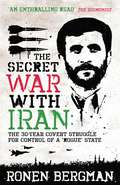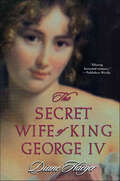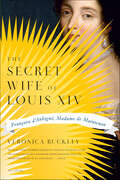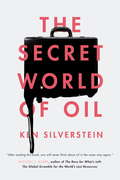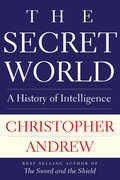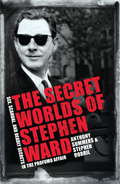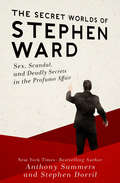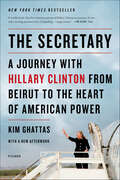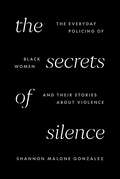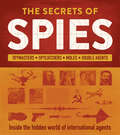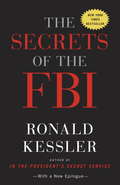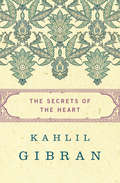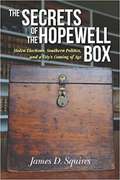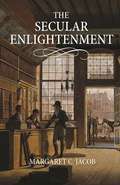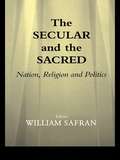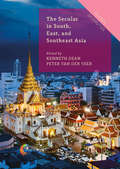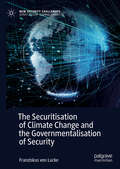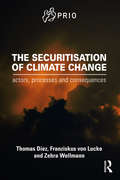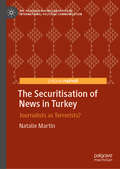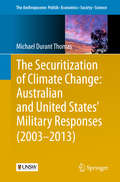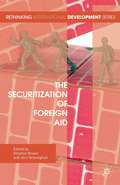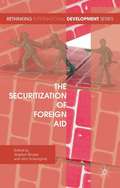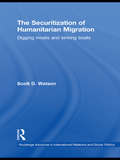- Table View
- List View
The Secret War with Iran: The 30-year Covert Struggle for Control of a Rogue State (Playaway Adult Nonfiction Ser.)
by Ronen BergmanWhile many now fear a looming war with Iran, few know that this war is already raging and has been doing so for the past three decades. Starting from the aftermath of the Iranian revolution, intelligence expert Ronen Bergman details the complex array of political manoeuvring, assassination attempts, arms trading, and suicide bombs that have characterised the secret war between Iran and the intelligence services of Israel and the United States. Drawing on interviews with a plethora of intelligence agents from all sides, this is a riveting exploration of the growing influence of Iran in the Middle East, and the covert activities of the CIA and Mossad to tackle Iran and its political ambitions.
The Secret Wife of King George IV
by Diane HaegerAlthough it was illegal, secret, and against the express commands of his famously mad father, King George IV of England married twice--once for duty and once for love. While Caroline of Brunswick eventually became his lawful queen, it was the beautiful Maria Fitzherbert, recognized as his wife by the Catholic Church but not by the laws of England, who claimed his heart. In the hands of author Diane Haeger, their relationship becomes a mesmerizing love story, filled with intrigue and passion. The characters and drawing rooms of 18th Century England come alive to create a portrait of the age that is colorful and resonant with historical detail.
The Secret Wife of Louis XIV: Françoise d'Aubigné, Madame de Maintenon
by Veronica BuckleyFrançoise d'Aubigné, marquise de Maintenon and secret wife of the Sun King, Louis XIV, was born in a bleak French prison in 1635, her father a condemned traitor and murderer, her mother the warden's seduced daughter. A timely pardon and a hopeful Caribbean colonial venture failed to mend the family's fortunes, and Françoise was reduced to begging in the streets. Yet, armed with beauty, intellect, and shrewd judgment, she was to make her way to the center of power at Versailles, the most opulent and ambitious court in all Europe.At fifteen, she was married off to the forty-two-year-old satirical poet Paul Scarron, a former roué now grievously deformed by rheumatism—"a sort of human Z," as he described himself. Despite his ailments, Scarron presided over the liveliest and most scandalous literary salon in Paris, and Françoise quickly became its most prized ornament.After Scarron's death, she enjoyed a merry widowhood in the fashionable Marais district, in the company of the courtesan Ninon de Lenclos and the King's splendid mistress, Athénaïs de Montespan, who made the young widow governess to her brood of illegitimate children. The appointment transformed Françoise's life, but was fatal to the temperamental Athénaïs herself, with the King soon turning his attentions to the graceful governess. Françoise was raised to the nobility as Madame de Maintenon—and, unofficially, "Madame de Maintenant," the lady of the moment.The acclaimed biographer Veronica Buckley traces the extraordinary story of Françoise's progress from pauper child to salonnière to the compromised position of Louis's secret wife and uncrowned Queen. An absolute ruler, Louis turned away his many other mistresses to live with Françoise only, trusting her as his closest confidante and remaining in love with her for forty years.Sparkling with the irresistible wit of contemporary chroniclers such as Madame de Sévigné, this exactingly researched biography is a pinnacle of the form. In vibrant colors, The Secret Wife of Louis XIV paints a portrait of Europe in an age of violent change, and the Sun King's France in the process of becoming its modern self.
The Secret World of Oil
by Ken SilversteinThe oil industry provides the lifeblood of modern civilization, and bestselling books have been written about the industry and even individual companies in it, like ExxonMobil. But the modern oil industry is an amazingly shady meeting ground of fixers, gangsters, dictators, competing governments, and multinational corporations, and until now, no book has set out to tell the story of this largely hidden world.The global fleet of some 11,000 tankers--that's tripled during the past decade--moves approximately 2 billion metric tons of oil annually. And every stage of the route, from discovery to consumption, is tainted by corruption and violence, even if little of that is visible to the public.Based on trips to New York, Washington, Houston, London, Paris, Geneva, Phnom Penh, Dakar, Lagos, Baku, and Moscow, among other far-flung locals, The Secret World of Oil includes up-close portraits of a shadowy Baku-based trader; a high-flying London fixer; and an oil dictator's playboy son who has to choose one of his eleven luxury vehicles when he heads out to party in Los Angeles. Supported by funding from the prestigious Open Society, this is both an entertaining global travelogue and a major work of investigative reporting.
The Secret World: A History of Intelligence (The Henry L. Stimson Lectures Series)
by Christopher Andrew“A comprehensive exploration of spying in its myriad forms from the Bible to the present day . . . Easy to dip into, and surprisingly funny.” —Ben Macintyre in The New York Times Book ReviewThe history of espionage is far older than any of today’s intelligence agencies, yet largely forgotten. The codebreakers at Bletchley Park, the most successful WWII intelligence agency, were completely unaware that their predecessors had broken the codes of Napoleon during the Napoleonic wars and those of Spain before the Spanish Armada.Those who do not understand past mistakes are likely to repeat them. Intelligence is a prime example. At the outbreak of WWI, the grasp of intelligence shown by US President Woodrow Wilson and British Prime Minister Herbert Asquith was not in the same class as that of George Washington during the Revolutionary War and eighteenth-century British statesmen. In the first global history of espionage ever written, distinguished historian and New York Times–bestselling author Christopher Andrew recovers much of the lost intelligence history of the past three millennia—and shows us its continuing relevance.“Accurate, comprehensive, digestible and startling . . . a stellar achievement.” —Edward Lucas, The Times“For anyone with a taste for wide-ranging and shrewdly gossipy history—or, for that matter, for anyone with a taste for spy stories—Andrew’s is one of the most entertaining books of the past few years.” —Adam Gopnik, The New Yorker“Remarkable for its scope and delightful for its unpredictable comparisons . . . there are important lessons for spymasters everywhere in this breathtaking and brilliant book.” —Richard J. Aldrich, Times Literary Supplement“Fans of Fleming and Furst will delight in this skillfully related true-fact side of the story.” —Kirkus Reviews“A crowning triumph of one of the most adventurous scholars of the security world.” —Financial TimesIncludes illustrations
The Secret Worlds of Stephen Ward: Sex, Scandal and Deadly Secrets in the Profumo Affair
by Anthony Summers Stephen DorrilThe Profumo Affair was the political scandal of the twentieth century. The Tory War Minister, John Profumo, had been sleeping with the teenage Christine Keeler, while at the same time she had been sleeping with a Russian spy. The ensuing investigation revealed a secret world where titled men and prostitutes mixed, of orgies and S&M parties. The revelations rocked the British establishment to its core and lead to the resignation of the Prime Minister Harold Macmillan. And seemingly at the centre of it all was one man, Dr Stephen Ward.Stephen Ward was many things to many people. He was a successful osteopath to an establishment list of clients. He was a part-time artist who had drawn portraits of members of the Royal Family. To some he was a 'provider of popsies to rich people'; a man who knews lots of pretty girls of flexible morals. And finally, when the scandal came crashing down on the government, he was a scapegoat, put on trial and, ultimately, hounded to his death.The Secret Worlds of Stephen Ward is the definitive investigation into the Profumo scandal and the life and mysterious death of the man at its heart.
The Secret Worlds of Stephen Ward: Sex, Scandal, and Deadly Secrets in the Profumo Affair
by Anthony Summers Stephen DorrilA tour de force account of seduction, power, and betrayal in the biggest political sex scandal of its ageThe Profumo Affair rocked the British establishment like no scandal before or since. The Tory war minister, John Profumo, had taken up with a teenager named Christine Keeler, who was also sleeping with a Soviet intelligence agent. The ensuing inquiry revealed a hidden underworld in which men of the ruling classes and politicians cavorted with prostitutes at orgies. The revelations shook the British government and sent shock waves all the way to the Kennedy White House. The man at the center of the storm was Dr. Stephen Ward.Ward was a successful doctor to the rich and powerful, a talented artist who drew portraits of many of his famous patients and fixed up prominent men with young women. He was also a pawn, ruthlessly exploited by the intelligence agencies. When the Profumo Affair threatened the government, Ward became a scapegoat, hounded to death—and perhaps murdered.For the first time, The Secret Worlds of Stephen Ward reveals the names that could not be exposed and the truths that could not be told until now.
The Secretary: A Journey with Hillary Clinton from Beirut to the Heart of American Power
by Kim GhattasThe first inside account to be published about Hillary Clinton's time as secretary of state, anchored by Ghattas's own perspective and her quest to understand America's place in the worldIn November 2008, Hillary Clinton agreed to work for her former rival. As President Barack Obama's secretary of state, she set out to repair America's image around the world—and her own. For the following four years, BBC foreign correspondent Kim Ghattas had unparalleled access to Clinton and her entourage, and she weaves a fast-paced, gripping account of life on the road with Clinton in The Secretary.With the perspective of one who is both an insider and an outsider, Ghattas draws on extensive interviews with Clinton, administration officials, and players in Washington as well as overseas, to paint an intimate and candid portrait of one of the most powerful global politicians. Filled with fresh insights, The Secretary provides a captivating analysis of Clinton's brand of diplomacy and the Obama administration's efforts to redefine American power in the twenty-first century.Populated with a cast of real-life characters, The Secretary tells the story of Clinton's transformation from popular but polarizing politician to America's envoy to the world in compelling detail and with all the tension of high stakes diplomacy. From her evolving relationship with President Obama to the drama of WikiLeaks and the turmoil of the Arab Spring, we see Clinton cheerfully boarding her plane at 3 a.m. after no sleep, reading the riot act to the Chinese, and going through her diplomatic checklist before signing on to war in Libya—all the while trying to restore American leadership in a rapidly changing world.Viewed through Ghattas's vantage point as a half-Dutch, half-Lebanese citizen who grew up in the crossfire of the Lebanese civil war, The Secretary is also the author's own journey as she seeks to answer the questions that haunted her childhood. How powerful is America really? And, if it is in decline, who or what will replace it and what will it mean for America and the world?
The Secrets of Silence: The Everyday Policing of Black Women and Their Stories about Violence
by Shannon Malone GonzalezWhy black women&’s stories of encounters with the police are missing from official and unofficial accounts of police violenceIn The Secrets of Silence, Shannon Malone Gonzalez investigates how the policing of black women is tied to the policing of their stories. Over a period of four years, Malone Gonzalez conducted intimate life-history interviews with black women about their encounters, listening to those who had never shared their stories before, had never even been asked to, or had tried repeatedly to speak to those around them to no avail. They all described the unspoken or whispered connections in the ways officers and communities socially control black women to put them &“in their place.&” Centering black women&’s searches for recognition of their violent encounters with police and other people in their lives, Malone Gonzalez examines the pervasive and often invisible forms of everyday policing that render black women&’s stories missing from official data, headlines, and community conversations.Articulating what she calls &“the space between&” recognition of black women&’s stories and their encounters, Malone Gonzalez shows that policing is as much about silence as it is about violence. Black women&’s silenced stories, then, provide a way to name and critique the institutional and intimate forms of policing that break and bend black social relations into a complex web of social control. Drawing on abolition feminism and black knowledge traditions, she envisions storytelling—and listening—as a way to reimagine, remember, and reconnect in solidarity and worldbuilding.
The Secrets of Spies: Inside the Hidden World of International Agents
by Adrian Gilbert Rob Colson Heather VescentPacked with dastardly details, this collection shares thrilling tales of spies from the ancient world of Sun Tzu to the latest cyber threats.From James Bond to Mata Hari, in scores of books and movies, and on the front pages of newspapers, spies have always captured our imagination. But what’s the truth behind the fiction? The Secrets of Spies sheds light on the mysterious life of the spy, explaining the real-life origins of spying, examining some of history’s most notorious spies and spycatchers, and revealing the role espionage plays today in business, politics, and everyday life.Filled with lavish illustrations and hundreds of full-color photographs, this book provides hours of fun and entertainment for any reader. Narrated in an engaging, compelling style, The Secrets of Spies is a thrilling, in-depth global investigation of the hidden history of espionage. From ninja assassins to computer hackers, the book uncovers the tools, tricks, and techniques that make up the daring art of the spy.
The Secrets of the FBI: The Secret History Of The Fbi
by Ronald KesslerThe Secrets of the FBI by New York Times bestselling author Ronald Kessler reveals the FBI's most closely guarded secrets and the secrets of celebrities, politicians, and movie stars uncovered by agents during their investigations. Based on inside access, the book presents revelations about the raid on Osama bin Laden's compound, the recent Russian spy swap, Marilyn Monroe's death, Vince Foster's suicide, and J. Edgar Hoover's sexual orientation. For the first time, it tells how the FBI caught spy Robert Hanssen in its midst and how the FBI breaks into homes, offices, and embassies to plant bugging devices without getting caught.From Watergate to Waco, from congressional scandals to the killing of bin Laden, The Secrets of the FBI presents headline-making disclosures about the most important figures and events of our time.From the Hardcover edition.
The Secrets of the Heart
by Kahlil GibranAn early collection of Kahlil Gibran&’s writings, showcasing the many styles of this prolific thinker, all profoundly beautiful Kahlil Gibran reveals his vision of the soul and understanding of the world—past, present, and future—in this rich sampling of more than twenty works. Prose tales, fables, and poems evoke the mystic East and form a world at once powerful, tender, joyous, and melancholy. This collection, penned when Gibran was still a young writer, reveals many of the themes and styles plumbed throughout his life, including his lifelong struggle against injustice in &“The Crucified,&” his heart-wrenching lament for a Lebanon shackled by tradition and politics in &“My Countrymen,&” and his masterful use of symbolism and simile in &“The Secrets of the Heart.&” A writer with infinite abilities, Gibran continually seeks true beauty, no matter the form.
The Secrets of the Hopewell Box: Stolen Elections, Southern Politics, and a City's Coming of Age
by James D. Squires"Squires' . . . grandfather was a sheriff's deputy who carried a gun and a clenched fist, a man whose talk with cronies was full of references to 'sonofabitching judges' and 'goddamn niggers.' He was also, Squires relates, one of the muscle men behind a vicious cabal of power brokers headed by one Boss Crump. . . . That machine involved, for a time, much of Nashville's leading citizenry. It engineered elections, stole votes, organized lynch mobs, ran an illegal gambling empire, and in the 1950s, when it appeared that the traditional Democratic Party was going soft on civil rights, brokered the advent of Republicanism in one corner of the South."--Kirkus Reviews"His richly-textured narrative charts the Nashville machine's rupture with the state's top political boss, Edward Crump of Memphis, and traces the sweeping reforms that shattered rural white control of the state legislature. Squires dramatically reenacts the downfall of Nashville lawyer Tommy Osborne, convicted of jury tampering in 1964 after defending Teamsters boss Jimmy Hoffa. He follows Nashville's transformation into a crucible of the civil rights movement in this stirring chronicle of the South's coming-of-age."--Publishers WeeklyBack in print (the book was originally published by Random House in 1996) and available for the first time in electronic form.
The Secular Enlightenment
by Margaret C. JacobA major new history of how the Enlightenment transformed people’s everyday livesThe Secular Enlightenment is a panoramic account of the radical ways that life began to change for ordinary people in the age of Locke, Voltaire, and Rousseau. In this landmark book, familiar Enlightenment figures share places with voices that have remained largely unheard until now, from freethinkers and freemasons to French materialists, anticlerical Catholics, pantheists, pornographers, readers, and travelers.Margaret Jacob, one of our most esteemed historians of the Enlightenment, reveals how this newly secular outlook was not a wholesale rejection of Christianity but rather a new mental space in which to encounter the world on its own terms. She takes readers from London and Amsterdam to Berlin, Vienna, Turin, and Naples, drawing on rare archival materials to show how ideas central to the emergence of secular democracy touched all facets of daily life. Human frailties once attributed to sin were now viewed through the lens of the newly conceived social sciences. People entered churches not to pray but to admire the architecture, and spent their Sunday mornings reading a newspaper or even a risqué book. The secular-minded pursued their own temporal and commercial well-being without concern for the life hereafter, regarding their successes as the rewards for their actions, their failures as the result of blind economic forces.A majestic work of intellectual and cultural history, The Secular Enlightenment demonstrates how secular values and pursuits took hold of eighteenth-century Europe, spilled into the American colonies, and left their lasting imprint on the Western world for generations to come.
The Secular and the Sacred: Nation, Religion and Politics
by William SafranWhat is the place of religion in modern political systems? This volume addresses that question by focusing on ten countries across several geographic areas: Western and East-Central Europe, North America, the Middle East and South Asia. These countries are comparable in the sense that they are committed to constitutional rule, have embraced a more or less secular culture, and have formal guarantees of freedom of religion. Yet in all the cases examined here religion impinges on the political system in the form of legal establishment, semi-legitimation, subvention, and/or selective institutional arrangements and its role is reflected in cultural norms, electoral behaviour and public policies. The relationship between religion and politics comes in many varieties in differing countries, yet all are faced with three major challenges: modernity, democracy and the increasingly multi-ethnic and multi-religious nature of their societies.
The Secular in South, East, and Southeast Asia (Global Diversities)
by Peter van der Veer Kenneth DeanThis innovative edited collection provides a comprehensive analysis of modern secularism across Asia which contests and expands prevailing accounts that have predominantly focused on the West. Its authors highlight that terms like ‘secular’, ‘secularization’, and ‘secularism’ do not carry the same meanings in the very different historical and cultural contexts of Asia. Critiquing Charles Taylor’s account of secularism, this book examines what travelled and what not in ‘the imperial encounter’ between Western secular modernity and other traditions outside of the West. Throughout the book, state responses to religion at different points in Chinese and South-East Asian history are carefully considered, providing a nuanced and in-depth understanding of post-secular strategies and relations in these areas. Particular attention is given to Catholicism in the Philippines, Vietnam, and Singapore, and Hinduism and Chinese religion in Malaysia, Singapore, and India. This theoretically engaged work will appeal to students and scholars of Asian studies, anthropology, religious studies, history, sociology, and political science.
The Securitisation of Climate Change and the Governmentalisation of Security (New Security Challenges)
by Franziskus von LuckeThis book provides an in-depth analysis of the securitisation of climate change in the US, Germany and Mexico and offers a rethinking of securitisation theory. Resting on a Foucauldian governmentality approach, it discusses how different climate security discourses have transformed the political handling of climate change and affected policies, practices and institutions. Going beyond the literature’s predominant focus on the global level, it gives a fine-grained examination of the political and institutional changes in different national contexts. Drawing on the governmentalisation of security, the book develops a new understanding of securitisation that focuses on the role of power. In doing so, it provides new insights into the transformative potential of linking climate change to security but also highlights the political and normative pitfalls of securitisation. ‘In this important book, Franziskus von Lucke provides a theoretically sophisticated and empirically rich account of the relationship between security and climate change. Developing a Foucauldian-inspired account of securitization, the book rejects blanket or universal claims about the climate change- security relationship, instead insisting on the need to critically examine how the securitization of climate change plays out in particular empirical contexts. Exploring the cases of the US, Germany and Mexico, von Lucke points to distinctive dynamics of securitization in these settings, with different implications for the practices these in turn encourage. Ultimately, this book constitutes an important addition to literature on the relationship between climate change and security, while developing a distinct and nuanced account of securitization that will be of interest to a wide range of scholars of security in international relations.’—Associate Professor Matt McDonald is a Reader in International Relations at the University of Queensland, Australia ‘In 2019 a number of states and other actors (notably the European Union) have made climate emergency declarations. It is therefore more important than ever to understand what the securitization of the climate means. That is: Who can securitize? What security measures are likely/ deemed legitimate by relevant audiences? How does securitization affect the population within and outside a securitizing state? And perhaps most importantly of all, will it succeed? Franziskus von Lucke’s carefully researched book offers answers to all of these questions and many others besides. von Lucke proceeds by examining with the US, Mexico and Germany, three real-life empirical cases of climate securitization. Each one provides unique insights that enable a fuller understanding of climate security. Accessibly written this is a must read for scholars and practitioners alike.’ —Dr Rita Floyd, University of Birmingham, UK, author of The Morality of Security: A theory of just Securitization, CUP, 2019 With great empirical detail and conceptual clarity, the book compares discourses and practices of climate security in different contexts. An essential reading for anyone interested in international climate politics, securitization theory, governmentality and the notion of power in International Relations. —Dr Delf Rothe, Institute for Peace Research and Security Policy Hamburg at the University of Hamburg, Germany
The Securitisation of Climate Change: Actors, Processes and Consequences (PRIO New Security Studies)
by Thomas Diez Franziskus von Lucke Zehra WellmannThis book provides the first systematic comparative analysis of climate security discourses. It analyses the securitisation of climate change in four different countries: USA, Germany, Turkey, and Mexico. The empirical analysis traces how specific climate-security discourses have become dominant, which actors have driven this process, what political consequences this has had and what role the broader context has played in enabling these specific securitisations. In doing so, the book outlines a new and systematic theoretical framework that distinguishes between different referent objects of securitisation (territorial, individual and planetary) and between a security and risk dimension. It thereby clarifies the ever-increasing literature on different forms of securitisation and the relationship between security, risk and politics. Whereas securitisation studies have traditionally focused on either a single country case study or a global overview, consequently failing to reconstruct detailed securitisation dynamics, this is the first book to provide a systematic comparative analysis of climate security discourses in four countries and thus closes an empirical gap in the present literature. In addition, this comparative framework allows the drawing of conclusions about the conditions for and consequences of successful securitisation based on empirical and comparative analysis rather than theoretical debate only. This book will of interest to students of climate change, environmental studies, critical security, global governance, and IR in general.
The Securitisation of Migration in the EU: Debates Since 9/11 (The European Union in International Affairs)
by Gabriella Lazaridis Khursheed WadiaThe Securitisation of Migration in the EU.
The Securitisation of Migration in the EU: Debates Since 9/11 (The European Union in International Affairs)
by Gabriella Lazaridis Khursheed WadiaSince 9/11 Western states have sought to integrate 'securitisation' measures within migration regimes as asylum seekers and other migrant categories come to be seen as agents of social instability or as potential terrorists. Treating migration as a security threat has therefore increased insecurity amongst migrant and ethnic minority populations.
The Securitisation of News in Turkey: Journalists as Terrorists? (The Palgrave Macmillan Series in International Political Communication)
by Natalie MartinThis book examines why Turkey has become infamous as a repressor of news media freedom. For the past decade or so it has stood alongside China as a notorious jailer of journalists – at the same time as being a candidate state of the EU. The author argues that the reasons for this conundrum are complex and whilst the AKP is responsible for the most recent illiberality, its actions should be taken in the wider context of Turkish politics – and the three way battle for power which has been raging between Kemalists, Kurds and Islamists since the republic was founded in 1923. The AKP are the current winners of this tripartite power struggle and the securitisation of journalists as terrorists is part of that quest. Moreover, whilst securitisation is not new, it has intensified recently as the number of the AKP’s political opponents has proliferated. Securitisation is also a means of delegitimising journalism – and neutralizing any threat to the AKP’s electoral prospects – whilst maintaining a democratic façade on the world stage. Lastly, the book argues that whilst the AKP’s securitisation of news began as a means of quashing the reporting of illiberality against wider political targets, since 2016 it has become a target in its own right. In the battle for power in Turkey, journalism is now one of the many losers.
The Securitization of Climate Change: Australian and United States' Military Responses (2003 - #2013)
by Michael Durant ThomasThis book examines the process of climate securitization within the United States and Australian political-military sector between 2003 - 2013. Drawing on established securitization frameworks ("Copenhagen" and "Paris" Schools), the author uses a combination of qualitative and quantitative techniques to systematically analyze more than 3,500 official publications from the US and Australian political-military sector. The results offers a rare insight into how each military framed climate change as a security threat and formulated their own unique institutional responses within a heavily politicized context. The book consists of eight chapters divided into four parts; focusing on: perspectives/methodological insights; empirical case studies; case study comparison and concluding observations.
The Securitization of Foreign Aid (Rethinking International Development series)
by Stephen Brown J�rn Gr�vingholtSecurity concerns increasingly influence foreign aid: how Western countries give aid, to whom and why. With contributions from experts in the field, this book examines the impact of security issues on six of the world's largest aid donors, as well as on key crosscutting issues such as gender equality and climate change.
The Securitization of Foreign Aid (Rethinking International Development)
by Stephen Brown Jörn GrävingholtSecurity concerns increasingly influence foreign aid: how Western countries give aid, to whom and why. With contributions from experts in the field, this book examines the impact of security issues on six of the world's largest aid donors, as well as on key crosscutting issues such as gender equality and climate change.
The Securitization of Humanitarian Migration: Digging moats and sinking boats (Routledge Advances in International Relations and Global Politics #Vol. 74)
by Scott D. WatsonThis book examines how western liberal states are progressively restricting access to refugees and asylum seekers, even though these states have signed international agreements obliging them to offer protection to those fleeing persecution and to advocate the spread of human rights and humanitarian principles. Watson examines how refugees and asylum seekers have come to be treated so poorly by these states through the use of policies such as visa requirements, mandatory detention and prevention/return policies. Providing extensive documentary analysis of debates on ‘restrictive’ refugee policies in Canada and Australia, the author addresses the relationship between security and migration, an issue of increased importance in the aftermath of 9/11 and the war on terror. He then examines hotly-contested policies such as detention and the forceful return of asylum seekers to demonstrate how attempts to securitise these issues have been resisted in the media and by political opposition. Given the importance of providing refuge for persecuted populations, not only to ensure the survival of targeted individuals, but also to maintain international peace and security, the erosion of protective measures is of great importance today. The book will be of interest to students and scholars of international security, international relations, migration and human rights
